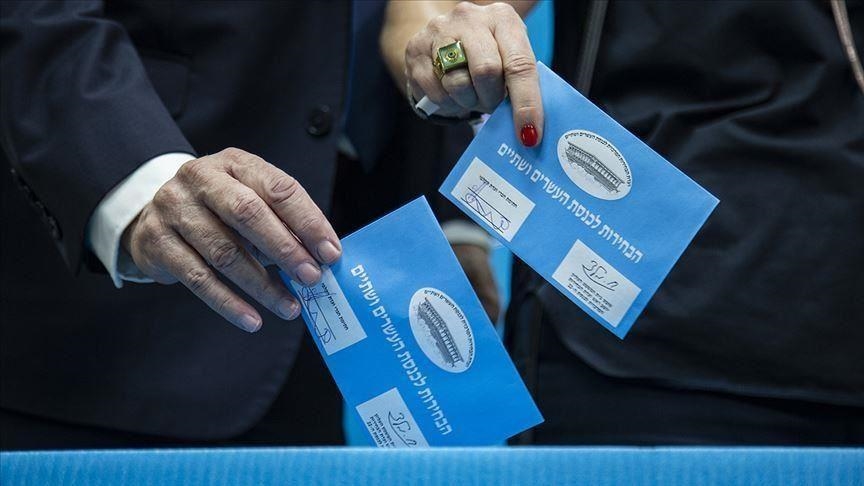Palestinians grow uninterested in Israeli elections
Israeli voters to elect new Knesset on March 23

RAMALLAH, Palestine
As Israeli voters go to polls on Tuesday to elect members of the Knesset (Israel’s parliament), Palestinians show less interest in the elections this time.
Analysts cite the absence of the Palestinian issue during electoral campaigns by Israeli parties as a main cause of the Palestinian declining interest in the vote.
No single party is projected to secure the simple majority in the Knesset (50%+1) to form a government during Tuesday’s polls, the fourth in Israel in two years.
The Israeli elections come two months before Palestinians vote in legislative elections on May 22, their first in 15 years.
“Israel is like a wrestling arena with only one wrestler surrounded by boys who cannot even approach him,” Khaled Al-Amayrah, a political analyst, told Anadolu Agency.
Al-Amayrah was referring to Israeli Prime Minister Benjamin Netanyahu, who dominated the political life in Israel for the last 12 years.
“The political scene in Israel has been dominated by the extreme right-wing, including parties that support the expulsion of the Palestinians,” he said.
Interim phase
Al-Amayrah opines that the Palestinians are currently preoccupied by the upcoming Palestinian election.
“The Palestinian Authority is in a transitional phase and prepares for general elections. It cannot decide its next step,” he said.
Peace talks between Palestine and Israel have stalled since 2014 as a result of the latter's refusal to stop settlement building activity in the occupied territories and to accept the 1967 borders as a basis for negotiating the establishment of a Palestinian state.
Last year, four Arab countries – the United Arab Emirates (UAE), Bahrain, Morocco, and Sudan – announced the normalization of relations with Israel, joining earlier Arab signatories Egypt and Jordan.
Al-Amayrah said the Palestinians find themselves “between the rock of the occupation and the hard place of the Arab-Israeli normalization”.
Declining interest
Palestinian writer Muhammad Abu Allan argues that the Palestinian interest in the Israeli elections has declined.
“The Palestinians are now convinced that both Israeli citizens and elite are united in opposing the Palestinian cause and rejecting the Palestinian right to establish an independent state,” he said.
Abu Allan cited the poor support to the Meretz and Labor Party, which back a two-state solution to prove his point.
Abu Allan also said the Palestinians see Israelis immersed in their internal politics and that previous Israeli polls have failed to produce an Israeli leadership with a clear policy on the Palestinians.
“Even if the upcoming elections produce a new leadership, it will have no enough time to solve internal Israeli issues, meaning that the Palestinian issue will be absent from its agenda,” Abu Allan noted.
The Palestinian writer also believes that the devastating effects of the coronavirus pandemic have “distracted politicians from all political issues”.
Helpless leadership
Imad Abu Awad, a researcher at the Jerusalem Center for Studies of Israeli and Palestinian Affairs, thinks that the Palestinian Authority is powerless and helpless.
"Palestinian politicians hope that Netanyahu will remain in power for fear that a more radical leader might go on with the annexation plan at once,” he said.
"The Palestinian leadership has become a spectator and helpless," Abu Awwad said.
The Israeli government had planned to annex parts of the occupied West Bank in July of last year but postponed the move under international pressure.
While Palestinians are growing uninterested in the elections, Israeli party campaigns have been ongoing in the West Bank settlements in an effort to court settler voters.
Last week, the Palestinian Ministry of Foreign Affairs issued a statement condemning Israel’s electoral campaigning in the occupied territory.
The ministry had earlier decried Netanyahu's visit to a settlement in the southern West Bank as an attempt “to win the settler votes”.
Palestinian official figures say that around 650,000 Israeli settlers live in 164 settlements and 124 outposts built on occupied lands in the West Bank and Jerusalem.
*Ibrahim Mukhtar contributed to this report from Ankara








